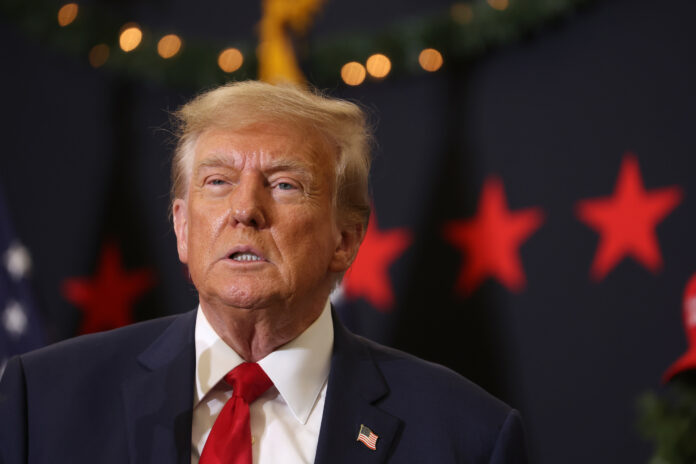Former President Donald Trump’s trial into hush money payments he allegedly made during his 2016 presidential campaign could be over as soon as May, legal experts told Newsweek.
Judge Juan Merchan set an April 15, 2024, start date for the trial during a hearing on Monday, setting the stage for Trump’s first criminal trial ahead of the presidential election in November.
The case focuses on Manhattan District Attorney Alvin Bragg’s investigation into an alleged hush money payment made during Trump’s 2016 presidential campaign to adult film actor Stormy Daniels. Daniels has claimed to have had an affair with Trump, which the former president has denied.
Bragg charged Trump with allegedly falsifying business documents in relation to the payment, which was allegedly made to prevent her from discussing her affair claims publicly. Trump has pleaded not guilty to all charges, accusing Bragg of targeting him for political purposes.
Scott Olson/Getty Images
The case may wrap up in only two to three weeks, according to legal experts.
“This case should take no more than two to three weeks. It’s relatively straightforward, it’s not complex. It has a lot of documents but they’re easy to comprehend and understand. It’s very simple,” attorney Gene Rossi, who previously represented one of Daniel’s lawyers Keith Davidson, told Newsweek.
Meanwhile, former federal prosecutor Barbara McQuade told Newsweek she would be surprised if the case lasted more than three weeks, pointing to a “finite number of witnesses, and a relatively simple scheme.”
Still, she noted the case could be prolonged if Judge Merchan opts for half days or takes days off to attend to other matters, or even if Trump puts on a lengthy defense.
“The case mostly relies on documents, with witness testimony from Michael Cohen, Stormy Daniels, some AMI executives, and likely some investigators,” she said.
Michael McAuliffe, a former federal prosecutor and former elected state attorney, told Newsweek that jury selection will be the “critical” phase of the trial and may take longer because most prospective jurors already may have strong opinions about Trump.
Judge Merchan may also not hold the trial on days when jurors are unable to attend, such as Passover, which will fall in the second week of the trial schedule, he said.
“The unknown variable in the length of the trial is how the judge maintains control of the courtroom. For example, longwinded, repetitive objections can eat up significant time,” he said.
Former federal prosecutor Neama Rahmani agreed the jury selection will be challenging because “people either think he’s a criminal or being railroaded by our justice system.”
Judge Merchan may go through “hundreds” of possible jurors to find 12 who would be impartial, he said. The case may last longer, as Trump said he plans to take the stand. Meanwhile, cross-examination of Trump’s former lawyer Michael Cohen could take multiple days, he said.
Trump said during a press conference on Monday he plans to take the stand in the trial. He said he plans to appeal, and criticized prosecutors for bringing the case in the middle of the election.
Carl Tobias, Williams chair in law at the University of Richmond, said that Trump saying he plans to appeal the trial date could make it difficult to know the timeline, saying that Trump and his legal team “seem to be doing all they possibly can to delay the trial until after the election.”
Newsweek reached out to Trump’s campaign for comment via email.
Will Trump Face Jailtime in Hush Money Case?
The former president is unlikely to face prison time for these charges, according to legal experts.
Rossi said the case is unlikely to result in jail time, as that is not particularly common for the charges faced by Trump, and judges tend to have more “latitude” when sentencing older defendants.
“I think if he’s sentenced in guilty verdicts after a conviction, he could get home detention and an ankle monitor and maybe throw in some community service,” he said.
McAuliffe agreed that prison is not a “realistic possibility” in this case but noted that a guilty verdict would turn him into a convicted felon, potentially limiting his ability to travel, contact certain individuals or conduct certain business activities.
He may also lose the ability to vote for himself in the presidential race, McAuliffe said.
“If Trump is sentenced to prison, he would not be able to vote under New York law, and thus could not vote in Florida as a resident. If he is sentenced to probation as the sentence, then it appears under Florida law, he would still be able to vote as a felon because the felony would be from New York and New York law allows someone on probation to still vote,” he said.
Uncommon Knowledge
Newsweek is committed to challenging conventional wisdom and finding connections in the search for common ground.
Newsweek is committed to challenging conventional wisdom and finding connections in the search for common ground.


